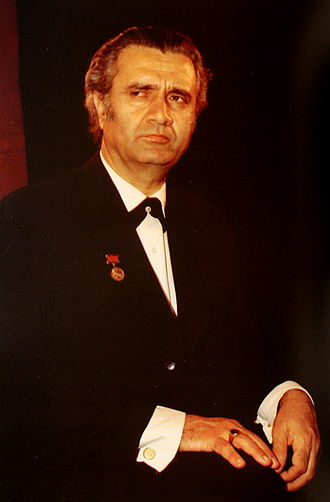
Arutiunian, Alexander
Arutiunian was born in Yerevan, Armenia, in the family of Grigor and Eleonora Arutiunian. His father was a military serviceman. In 1927, Arutiunian became a member of the Yerevan State Conservatory’s children group, then, at age 14, he was admitted to the Conservatory to the studios of Olga Babasyan (piano), and Sergei Barkhudaryan and Vardges Talyan (composition). He graduated from the Music Conservatory of Yerevan on the eve of World War II. After the war he moved to Moscow, where between 1946 and 1948 he participated in the workshops of House of Armenian Culture, studied composition with Genrikh Litinsky. After graduation he returned to Yerevan to teach at the local Conservatory and in 1954 he was appointed artistic director of the Armenian State Philharmony. He was also a member of the Board of the USSR Composers’ Union, as well as of the Armenian SSR Composers’ Union.
In 1949, Arutiunian was awarded the Stalin Prize for his cantata Motherland,[3] a graduation piece he wrote as a student at the Moscow Conservatory. The USSR Radio Choir and Orchestra premiered this work in November 1948.
In 1949, Arutiunian composed the “Festive Overture” that was first performed in the Big Hall of the Leningrad Philharmonic in November 1949, with Evgeny Mravinsky conducting. During the Moscow Music Congress Aram Khachaturian considered him as a promising Soviet composer.[4] He continued to win acclaim at home and abroad for his works, many of which are quickened by the folk traditions of Armenian music. Other works of that kind include The tale of Armenian people (1960), Ode to Lenin (1967) and Hymn to the brotherhood (1970).
In 1950, Arutiunian married Irina (Tamara) Odenova. Their marriage produced two children, a daughter, Narine (born 1951), who is a pianist and lawyer; and a son, Suren (born 1953), who is an artist-designer. His extended family includes 3 granddaughters and a grandson. He died, aged 91, in his home city of Yerevan. Arutiunian is buried at the Komitas Pantheon which is located in the city center of Yerevan.
Some of Arutiunian’s works for wind instruments include his 1950 concerto for trumpet, the concerto for tuba, and the brass quintet Armenian Scenes. In 1988, inspired by the Spitak earthquake, Arutiunian composed his Concerto for Violin and String Orchestra, Armenia-88[3] (dedicated to Ruben Aharonyan). The premiere took place in Yerevan in 1989.
